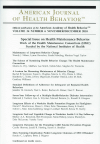
Promoting the Well-being of Urban Youth through Drama-based Peer Education
Keywords: ADOLESCENT WELL-BEING; DRAMA INTERVENTIONS; PEER EDUCATION; URBAN YOUTH
Document Type: Research Article
Affiliations: 1: Associate Professor, The College of New Jersey, Department of Psychology, Ewing, NJ;, Email: [email protected] 2: Millhill Child & Family Development, Trenton, NJ 3: The College of New Jersey, Department of Psychology, Ewing, NJ
Publication date: 01 November 2017
The American Journal of Health Behavior seeks to improve the quality of life through multidisciplinary health efforts in fostering a better understanding of the multidimensional nature of both individuals and social systems as they relate to health behaviors.
The Journal aims to provide a comprehensive understanding of the impact of personal attributes, personality characteristics, behavior patterns, social structure, and processes on health maintenance, health restoration, and health improvement; to disseminate knowledge of holistic, multidisciplinary approaches to designing and implementing effective health programs; and to showcase health behavior analysis skills that have been proven to affect health improvement and recovery.
- Editorial Board
- Information for Authors
- Submit a Paper
- Subscribe to this Title
- Review Board
- Reprints and Permissions
- Ingenta Connect is not responsible for the content or availability of external websites
- Access Key
- Free content
- Partial Free content
- New content
- Open access content
- Partial Open access content
- Subscribed content
- Partial Subscribed content
- Free trial content